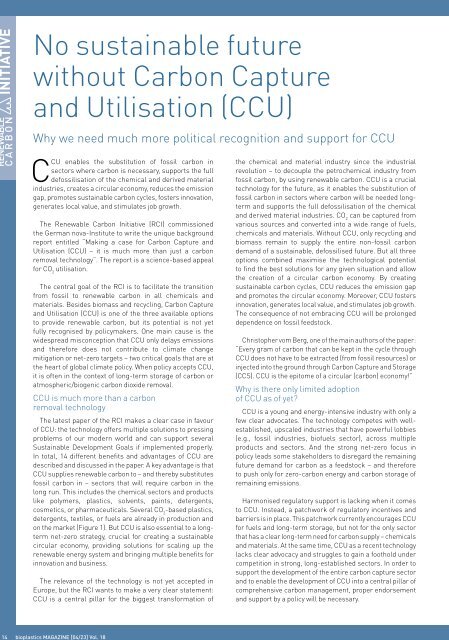Issue 04/2023
Highlights 100th issue Rebranding
Highlights
100th issue
Rebranding
Create successful ePaper yourself
Turn your PDF publications into a flip-book with our unique Google optimized e-Paper software.
14 bioplastics MAGAZINE [<strong>04</strong>/23] Vol. 18<br />
INITIATIVE<br />
RENEWABLE<br />
CARBON<br />
No sustainable future<br />
without Carbon Capture<br />
and Utilisation (CCU)<br />
Why we need much more political recognition and support for CCU<br />
CCU enables the substitution of fossil carbon in<br />
sectors where carbon is necessary, supports the full<br />
defossilisation of the chemical and derived material<br />
industries, creates a circular economy, reduces the emission<br />
gap, promotes sustainable carbon cycles, fosters innovation,<br />
generates local value, and stimulates job growth.<br />
The Renewable Carbon Initiative (RCI) commissioned<br />
the German nova-Institute to write the unique background<br />
report entitled “Making a case for Carbon Capture and<br />
Utilisation (CCU) – it is much more than just a carbon<br />
removal technology”. The report is a science-based appeal<br />
for CO 2<br />
utilisation.<br />
The central goal of the RCI is to facilitate the transition<br />
from fossil to renewable carbon in all chemicals and<br />
materials. Besides biomass and recycling, Carbon Capture<br />
and Utilisation (CCU) is one of the three available options<br />
to provide renewable carbon, but its potential is not yet<br />
fully recognised by policymakers. One main cause is the<br />
widespread misconception that CCU only delays emissions<br />
and therefore does not contribute to climate change<br />
mitigation or net-zero targets – two critical goals that are at<br />
the heart of global climate policy. When policy accepts CCU,<br />
it is often in the context of long-term storage of carbon or<br />
atmospheric/biogenic carbon dioxide removal.<br />
CCU is much more than a carbon<br />
removal technology<br />
The latest paper of the RCI makes a clear case in favour<br />
of CCU: the technology offers multiple solutions to pressing<br />
problems of our modern world and can support several<br />
Sustainable Development Goals if implemented properly.<br />
In total, 14 different benefits and advantages of CCU are<br />
described and discussed in the paper. A key advantage is that<br />
CCU supplies renewable carbon to – and thereby substitutes<br />
fossil carbon in – sectors that will require carbon in the<br />
long run. This includes the chemical sectors and products<br />
like polymers, plastics, solvents, paints, detergents,<br />
cosmetics, or pharmaceuticals. Several CO 2<br />
-based plastics,<br />
detergents, textiles, or fuels are already in production and<br />
on the market (Figure 1). But CCU is also essential to a longterm<br />
net-zero strategy, crucial for creating a sustainable<br />
circular economy, providing solutions for scaling up the<br />
renewable energy system and bringing multiple benefits for<br />
innovation and business.<br />
The relevance of the technology is not yet accepted in<br />
Europe, but the RCI wants to make a very clear statement:<br />
CCU is a central pillar for the biggest transformation of<br />
the chemical and material industry since the industrial<br />
revolution – to decouple the petrochemical industry from<br />
fossil carbon, by using renewable carbon. CCU is a crucial<br />
technology for the future, as it enables the substitution of<br />
fossil carbon in sectors where carbon will be needed longterm<br />
and supports the full defossilisation of the chemical<br />
and derived material industries. CO 2<br />
can be captured from<br />
various sources and converted into a wide range of fuels,<br />
chemicals and materials. Without CCU, only recycling and<br />
biomass remain to supply the entire non-fossil carbon<br />
demand of a sustainable, defossilised future. But all three<br />
options combined maximise the technological potential<br />
to find the best solutions for any given situation and allow<br />
the creation of a circular carbon economy. By creating<br />
sustainable carbon cycles, CCU reduces the emission gap<br />
and promotes the circular economy. Moreover, CCU fosters<br />
innovation, generates local value, and stimulates job growth.<br />
The consequence of not embracing CCU will be prolonged<br />
dependence on fossil feedstock.<br />
Christopher vom Berg, one of the main authors of the paper:<br />
“Every gram of carbon that can be kept in the cycle through<br />
CCU does not have to be extracted (from fossil resources) or<br />
injected into the ground through Carbon Capture and Storage<br />
(CCS). CCU is the epitome of a circular (carbon) economy!”<br />
Why is there only limited adoption<br />
of CCU as of yet?<br />
CCU is a young and energy-intensive industry with only a<br />
few clear advocates. The technology competes with wellestablished,<br />
upscaled industries that have powerful lobbies<br />
(e.g., fossil industries, biofuels sector), across multiple<br />
products and sectors. And the strong net-zero focus in<br />
policy leads some stakeholders to disregard the remaining<br />
future demand for carbon as a feedstock – and therefore<br />
to push only for zero-carbon energy and carbon storage of<br />
remaining emissions.<br />
Harmonised regulatory support is lacking when it comes<br />
to CCU. Instead, a patchwork of regulatory incentives and<br />
barriers is in place. This patchwork currently encourages CCU<br />
for fuels and long-term storage, but not for the only sector<br />
that has a clear long-term need for carbon supply – chemicals<br />
and materials. At the same time, CCU as a recent technology<br />
lacks clear advocacy and struggles to gain a foothold under<br />
competition in strong, long-established sectors. In order to<br />
support the development of the entire carbon capture sector<br />
and to enable the development of CCU into a central pillar of<br />
comprehensive carbon management, proper endorsement<br />
and support by a policy will be necessary.

















